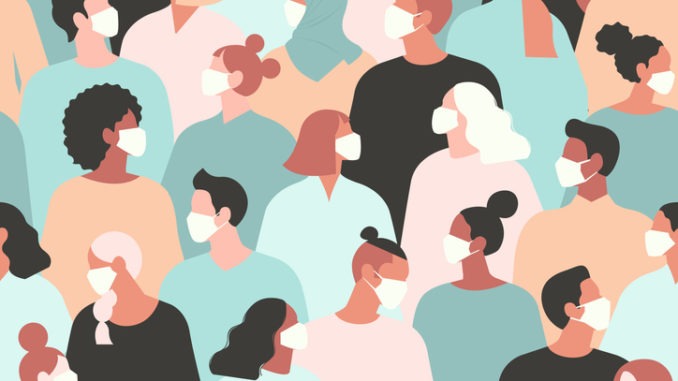
How often should you wash a cloth mask – and how effective are the disposable ones? Here is the expert guide to choosing, wearing and caring for your face covering
CREDIT: This is an edited version of an article that originally appeared on The Guardian
The British have been slow to embrace face masks, despite calls from public health experts; uptake has been just 25% in the UK, compared with 83.4% in Italy and 65.8% in the US.
Perhaps one of the problems has been the changing advice as new evidence emerges. The World Health Organization (WHO) now recommends people wear cloth masks. President of the Royal Society Venki Ramakrishnan has said that, in the UK, “The message has not been clear enough so, perhaps, people do not really understand the benefits, or are not convinced”.
A mask, says Martin McKee, a professor of European public health at the London School of Hygiene and Tropical Medicine, is a, “means of reducing the propensity of someone who has got COVID-19 to spread it to others. We’re not talking about protecting yourself by wearing one, but about reducing the risk to other people.”
Of course, wearing a covering is just one measure – along with handwashing and social distancing – to try to contain COVID-19, and seems particularly useful for stopping people who have, unwittingly, contracted the virus, but who are not showing symptoms, from spreading it.” If you do have symptoms, you should be self-isolating, not going out wearing a mask.
“What you’re doing,” Martin says, “is catching all the little droplets that are coming out of your mouth before they can get into the atmosphere, where they can dry out, become very small, and float around as an aerosol. There is still stuff that is going to get out, but you are reducing that risk.”
With so many of us still coming to terms with this ‘new normal’, we asked Martin, and other experts, to answer some common questions.
Which type of mask should you choose?
The one that may provide maximum protection for the wearer, says Maitreyi Shivkumar, a virologist and lecturer in molecular biology at De Montfort University, is a FFP3 respirator – a disposable, shaped mask with a valve that filters air . “We know that the production of these is more difficult, and healthcare workers are not getting access to them, so it is important to reserve those for frontline workers who come into contact with COVID-19 patients”.
In fact, masks with valves – found on dust masks and antipollution cycling masks, for instance – are thought not to be effective at stopping the spread of COVID-19. A study by researchers at the University of Edinburgh into different mask types found that the valves improved breathability for the wearer, but would not stop infectious matter being breathed out. “For the public, cloth masks are fine,” says Maitreyi. “There’s not a lot of data on the efficacy of cloth masks, but they’re better than nothing.”
How many times can you wear a disposable mask?
Jeremy Howard, a data scientist, and co-founder of the campaigning organisation Masks4All, says you should really only wear one once. “They’re not designed to be worn more than once, or cleaned,” he says.“They’re not a great choice to use at all. Disposable masks are, generally, surgical masks; they’re designed to protect from all the stuff that might be coming out of the surgeon’s face during surgery. They have to do so many things that they’re not perfect at any of them.
“A cloth mask, on the other hand, can have a better fit and more absorbent materials, and can be reused as many times as you like. It really is a better approach.”
Do expiry dates matter?
Some disposable masks come with an expiry date. If you’re planning to wear one for everyday use, is this something to worry about? “Do you want the official answer?” says Martin, with a laugh. “I’d have to say ‘Yes’.” He goes on to say that, as long as you’re just using the mask to nip to the chemists on the bus, rather than caring for COVID-19 patients in hospital, “the risk of using ones past their expiry date – providing they actually look physically all right – is probably fine for this sort of circumstance”.
Are homemade masks effective?
You can buy lots of ready-made cloth masks now, and there are also tutorials online showing you how to make your own. “Nearly any kind of face-covering is effective at blocking droplets coming out of your mouth,” says Jeremy. “Shortly after they come out of your mouth, they evaporate and become much harder to block, which means it is more difficult for masks to block droplets coming into your mouth.” There isn’t good evidence that wearing a mask will prevent you from getting, as opposed to spreading, COVID-19.
What material should you choose?
Any kind of tightly woven fabric is a good choice, says Maitreyi. “The more tightly woven, the better.” Jeremy recommends using 600-thread-count cotton which describes the number of threads per inch). “Things such as high-quality bedsheets, for example, generally, a better-quality cotton is going to have a higher thread count.” The WHO advises a combination of fabrics, with an inner layer of absorbent fabric to contain the droplets, and a more waterproof outer layer, such as polyester.
Is a scarf just as good?
“It’s better than nothing,” says Jeremy. The fabric may be too thin or, if it’s a chunkier scarf, it can be difficult to get several comfortable layers out of it. “There was some data suggesting that bandanas and scarves are not very good because the fabric has a lot of holes in it,” says Maitreyi.
How many layers should your mask have?
The WHO advises a minimum of three – although four layers can be up to seven times more effective than a single piece of fabric. The problem, says Jeremy, is that, “You don’t want to go overboard because it reduces breathability.” He suggests two layers of cloth with a filter inserted between them; this should be of a different material, such as a piece of paper towel or silk. Maitreyi has heard of people using coffee filters. “I use a piece of paper towel – I’ve got a little pocket for it in my mask,” says Jeremy. “When I come home I dispose of that, and put in a new one.”
How should it fit?
According to a University of Edinburgh study, masks need to have a tight fit to be really effective – though this needs to be balanced with wearability. A looser mask is better than no mask; it needs to be fairly snug to block droplets coming out of your mouth and, even though it has not been proven that a cloth mask, rather than personal protective equipment, protects the wearer from COVID-19, this may change.
There is, “some evidence that masks might directly benefit the wearer”, according to Paul Edelstein, emeritus professor of pathology and laboratory medicine at the University of Pennsylvania, and one of the authors of a new report for the Royal Society.


Be the first to comment